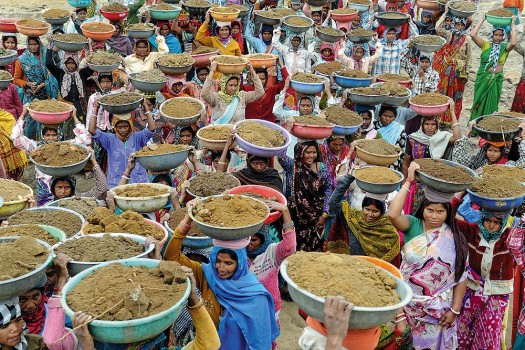MGNREGA: Wage Rate Revised.
~Preet.

The Ministry of Rural Development recently announced new compensation rates under the Mahatma Gandhi National Rural Employment Guarantee Act (MGNREGA) for the fiscal year 2022-23. The salary rates are published in accordance with the Mahatma Gandhi National Rural Employment Guarantee Act of 2005. The MGNREGA wage rates are determined by changes in the CPI-AL (Consumer Price Index-Agriculture Labor), which indicates the growth in rural inflation.
The Ministry of Rural Development recently announced new compensation rates under the Mahatma Gandhi National Rural Employment Guarantee Act (MGNREGA) for the fiscal year 2022-23. The salary rates are published in accordance with the Mahatma Gandhi National Rural Employment Guarantee Act of 2005. The MGNREGA wage rates are determined by changes in the CPI-AL (Consumer Price Index-Agriculture Labor), which indicates the growth in rural inflation.
MGNREGA is one of the world's largest work-guarantee programmes. The scheme's major goal is to provide 100 days of employment to adult members of any rural family who are willing to conduct public work-related unskilled manual labour each fiscal year. Unlike previous employment guarantee systems, the legislation seeks to address the root causes of persistent poverty through a rights-based framework. At least one-third of the recipients must be women. Pay must be paid in accordance with the Minimum Wages Act of 1948, which specifies the statutory minimum wages for agricultural labourers in the state. The most significant aspect of MGNREGA's design is its legally-backed assurance that every rural adult will find job within 15 days of requesting it, or else a 'unemployment allowance' will be paid. Workers can self-select under this demand-driven approach. There is a focus on enhancing the decentralisation process by providing Panchayati Raj Institutions (PRIs) a substantial role in planning and implementing these initiatives. The statute requires Gram Sabhas to suggest the works to be conducted, and they must carry out at least 50% of the work.
The majority of states have failed to pay wages within 15 days, as required under MGNREGA. Furthermore, workers are not rewarded if their salaries are not paid on time. As a result, the system has become a supply-driven programme, and people have begun to lose interest in working under it. There is now substantial proof, including an acknowledgment by the Ministry of Finance, that salary payment delays are caused by a lack of finances. Delays differed significantly depending on caste. While 46% of payments to SC (Scheduled Caste) workers and 37% of payments to ST (Scheduled Tribes) workers were made within the required seven days, just 26% of payments to non-SC/ST workers were fulfilled. Caste-based segregation has a particularly detrimental impact on impoverished states like Madhya Pradesh, Jharkhand, Odisha, and West Bengal. Gram panchayats are unable to execute this legislation effectively and efficiently due to their lack of autonomy. The completion of MGNREGA projects has been delayed, and project inspections have been sporadic. Under MGNREGA, there is also a problem with job quality and asset development. The availability of fraudulent work cards, the inclusion of bogus names, missing entries, and delays in generating job card entries are all difficulties.
Better coordination between various government agencies, as well as the process for allocating and measuring work, are required. There are also some anomalies in the payouts that need to be resolved. On average, women in the industry earn 22.24 percent less than their male colleagues. State governments must make certain that public construction begins in each village. Workers who arrive at the job site should be assigned tasks as soon as possible. Local governments must reach out to returning and quarantined migrant workers and assist those who require assistance in obtaining work permits. Gram panchayats must be given sufficient resources, authorities, and duties in order to authorise works, deliver work on demand, and allow salary payments in order to avoid payment delays. MGNREGA should be integrated with other government programmes. For instance, the Green India project and the Swachh Bharat Abhiyan.
Comments
Post a Comment